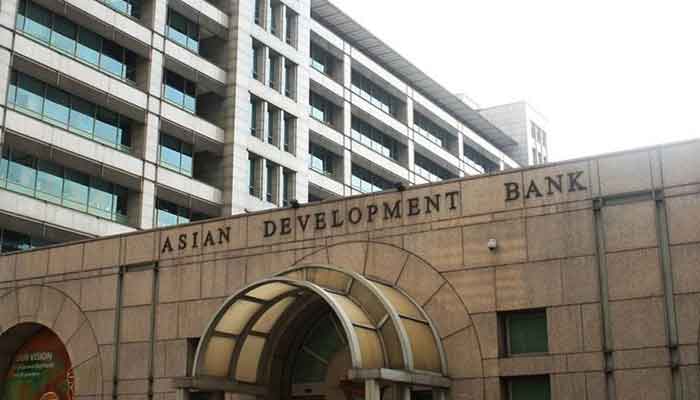ADB approves $500mln loan to improve trade competitiveness
ISLAMABAD: The Asian Development Bank (ADB) on Wednesday approved a $500 million worth of policy-based loan for Pakistan after a gap of one and half years as IMF-backed reforms in the country persuaded the lender to okay a part of $2 billion committed for the current fiscal year.
The policy-based loan would support the government’s reforms to improve trade competitiveness and exports as a defense against external shocks and to help finance the country’s trade deficit.
Manila-based lender also approved a $750,000 technical assistance package to support the preparation and implementation of the program. The loan is expected to be transferred into the central bank’s account by Thursday (today).
Secretary Economic Affairs Division Noor Ahmed and ADB Country Director Xiaohong Yang signed the loan agreement. Minister for Economic Affairs Hammad Azhar witnessed the signing ceremony.
Azhar said exports are concentrated in less sophisticated and lower value-added products and lack diversification and innovations. “ADB’s policy-based lending will not only strengthen the foreign exchange reserves but will also provide fiscal space to the government and boost economic activities in the country,” he said in a statement.
The minister emphasised that ADB should further scale up its assistance to Pakistan both for program lending and project financing. The policy loan is part of more than $2 billion committed by the ADB for the current fiscal year. The program was suspended for almost one and half year due to economic instability.
Sources said another program loan of $500 million for Pakistan’s power sector is also on cards on which discussions will be kick-started soon. The policy-based lending is expected to be approved by June 2020, they said.
“The ADB is all set to disburse over $2 billion in shape of program and project lending during the current fiscal year,” a top official in the finance ministry told The News. Yang said ADB supports the government’s development vision and policies. “ADB is providing its support for policy reforms and project financing in the key priority areas such as energy, road, social sector, water and irrigation and urban services.”
She reiterated ADB’s strong commitment to further strengthening and expanding its partnership with Pakistan. Pakistan has committed to a range of structural reforms to trade environment to improve export performance, reduce the current account deficit, and drive economic growth. Despite a 15 contraction last fiscal year, the country’s trade deficit amounted to $31.8 billion with exports standing at $22.9 billion and imports recorded at $54.7 billion.
Pakistan last month agreed to an International Monetary Fund’s (IMF) loan program to introduce structural reforms in the economy imperiled by current account deficit. It was the country’s 13th IMF loan since 1980s and one that started following another one that completed successfully in 2016.
The latest $6 billion extended fund facility was agreed following months long discussion between Pakistani authorities and the IMF staff. The program was needed to finance external account gap and to muster trust of other development partners for growth policies. IMF’s facility, as expected, turned on stagnant stream of foreign inflows with other financial institutions contributing to the funding.
IMF expected a huge $38 billion of inflows from bilateral and multilateral creditors over its program period of three years. The trade and competitiveness program would introduce important tariff and tax-related policy reforms to support export industries and increase their competitiveness internationally and also to strengthen key trade facilitating institutions, such as accreditation bodies, the Export-Import, known as EXIM, Bank of Pakistan, and the national single window.
“Trade is an important pillar in Pakistan’s overarching development objective to foster economic stability and sustainable high growth,” ADB Director General for Central and West Asia Werner Liepach said.
“The trade and competitiveness program will help define and implement key reforms to
help tackle these development challenges and bring livelihood opportunities to the people of
Pakistan.”
-
 Climate Nearing Dangerous Tipping Points, Study Shows
Climate Nearing Dangerous Tipping Points, Study Shows -
 James Van Der Beek, 'Dawson's Creek' Star, Dies At 48
James Van Der Beek, 'Dawson's Creek' Star, Dies At 48 -
 Threads Launches Dear Algo AI Feature To Personalise Feeds In Real Time
Threads Launches Dear Algo AI Feature To Personalise Feeds In Real Time -
 Police Take Action Over Andrew's Ties With Jeffrey Epstein While In UK Office
Police Take Action Over Andrew's Ties With Jeffrey Epstein While In UK Office -
 Courtney Love Makes First Appearance Since New Report On Kurt Cobain's Death
Courtney Love Makes First Appearance Since New Report On Kurt Cobain's Death -
 King Charles Anxious As Uncertainty Grows Over Sarah Ferguson’s Next Move
King Charles Anxious As Uncertainty Grows Over Sarah Ferguson’s Next Move -
 Real Reason Kim Kardashian Is Dating Lewis Hamilton
Real Reason Kim Kardashian Is Dating Lewis Hamilton -
 Rihanna Leaves Elderly Woman Star-struck In Viral Grocery Store Video
Rihanna Leaves Elderly Woman Star-struck In Viral Grocery Store Video -
 TikTok US Launches Local Feed Using Precise Location Data
TikTok US Launches Local Feed Using Precise Location Data -
 Jill Biden’s Former Husband Charged With Wife’s Murder
Jill Biden’s Former Husband Charged With Wife’s Murder -
 Zayn Malik Reveals Parenting Decision Gigi Hadid Criticized Him Over
Zayn Malik Reveals Parenting Decision Gigi Hadid Criticized Him Over -
 Palace Releases Prince William's Photos From Final Day Of His Saudi Arabia Visit
Palace Releases Prince William's Photos From Final Day Of His Saudi Arabia Visit -
 Microsoft Warns Of AI Double Agents As Enterprise Adoption Of AI Agents Surges
Microsoft Warns Of AI Double Agents As Enterprise Adoption Of AI Agents Surges -
 Kate Middleton, Prince William Break Silence Over Tragic Shooting In Canada
Kate Middleton, Prince William Break Silence Over Tragic Shooting In Canada -
 'Finding Her Edge' Star Madelyn Keys Explains Adriana's Remarks About Brayden Romance
'Finding Her Edge' Star Madelyn Keys Explains Adriana's Remarks About Brayden Romance -
 Royal Expert Raises Questions Over Sarah Ferguson's 'plotting' Stunning Comeback
Royal Expert Raises Questions Over Sarah Ferguson's 'plotting' Stunning Comeback




